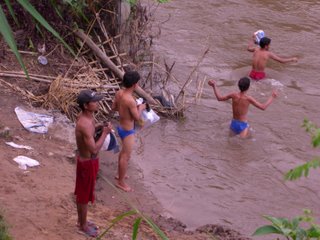Coordination on immigration? One might inquire as to what that actually entails. "Rangoon has been adamant that Bangkok send lists of Burmese migrant workers for verification by Burma, while Laos and Burma have sent officials to do the head-count inside Thailand," writes the Bangkok Post's Achara Ashayagachat. That's not cooperation. That's an invitation to Thai complicity in Myanmar's human rights abuses.
 And Thai complicity seems to be very real. When I interviewed one former Burmese prisoner who had suffered torture (photo), he said he lived in fear of Thai police who might send him back to Burma. This from a man who -- unlike the Burmese migrant workers -- actually has legal refugee status! In wake of the Burma protests of 2007, Thai security officials were reported to have harassed some Burma NGOs in Chang Mai -- at the bequest of Myanmar. (see "Are Thai agents helping Burma's junta?")
And Thai complicity seems to be very real. When I interviewed one former Burmese prisoner who had suffered torture (photo), he said he lived in fear of Thai police who might send him back to Burma. This from a man who -- unlike the Burmese migrant workers -- actually has legal refugee status! In wake of the Burma protests of 2007, Thai security officials were reported to have harassed some Burma NGOs in Chang Mai -- at the bequest of Myanmar. (see "Are Thai agents helping Burma's junta?")Meanwhile, concerning Burmese migrant workers, the Bangkok Post's Achara Ashayagachat makes some reasonable proposals in her opinion piece:
Non-government organisations and the International Labour Organisation have raised concerns about the "slow and expensive" registration system, which fails to allow labourers to change employers, even if they suffer abuses.
They call for a comprehensive labour migration management policy, instead of cracking down on the immigrants and driving them further underground. . . . .
This problem must be immediately tackled through a new round of registration, with immigrant labourers allowed to remain in the country for at least one year. Under the present system, the registration of foreign workers is aimed more at checking their numbers. . . .
Burma, unlike Laos and Cambodia, has refused to cooperate with Thailand in regulating the labour inflow.
These ideas reflect my own opinions on the matter, which I described in this post (which includes horrifying details about how the Burmese died). Also see my post, "Lives of Burmese migrants in Thailand."
Photo: Zaw Nyein Lat, President Burma Political Prisoner's Union. When in the border region, he told me he lives in fear of deportation to Burma by Thai authorities -- even though he has UN refugee status and United States residency status. How is this state of affairs possible?




